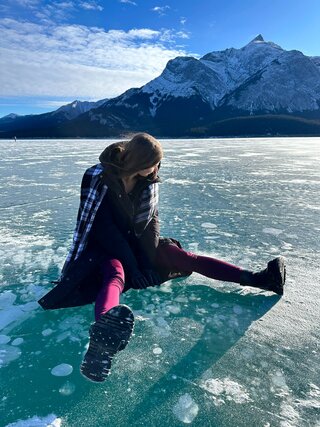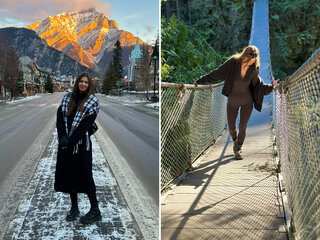A Polish woman discusses the two faces of Canada. "It's one of the worst places to start emigrating."

She packed her bags and moved to a continent completely different from Europe. She found her place in North America, but she didn't choose the popular United States, choosing instead Canada. She wasn't deterred by the freezing climate or the fact that she was in the second-largest country in the world – in terms of area, second only to Russia. Canada's total area is approximately 9.98 million km², making it the largest country in North America.
Today, living there, Paulina showcases Canada up close, both on social media and in YouTube videos. She strives to speak not only about cultural differences but also to inspire others to change their lives for the better. In an interview with "Wprost," she shares her impressions of her time in the "Land of the Maple Leaf" and explains how beneficial it is to let go of worrying about what others think of our travel choices.
Paulina Kopeć, "Wprost" You wrote in one of your posts: "Life abroad is more than just a change of address." What did moving to Canada and starting a life there mean to you? What challenges did it present?
Paulina Surzhko: For me, moving to Canada wasn't just a change of location, but above all, the beginning of a new chapter in my life. I saw it as an opportunity to reorganize my affairs, try something different, and test myself in new circumstances. It wasn't without its challenges. Above all, I had to adjust to a different culture, a different lifestyle, and everyday issues like harsh winters, a different government system, and healthcare. Despite this, I managed to manage everything, and in retrospect, I see that these experiences taught me a lot. They allowed me to appreciate new opportunities that would otherwise be impossible in Poland.
Was it difficult to organize a permanent move to Canada? In one interview, you said you didn't have a job lined up there or anything. How long did it take to organize all that after arriving? To settle in?
That's an interesting question, because there really wasn't anything waiting for me there. I didn't have a job planned in advance, nor a ready-made life plan. But I wasn't afraid of that at all. For me, the hardest part was always the waiting, not the action. Everything else could be achieved simply step by step. So, leaving for good came down to organizing documents and plane tickets. I arranged everything else on the fly after arriving. Sometimes the best plan in life is to have no plan, especially when you're moving to the other side of the world and have never been there.
When it comes to settling in, I have to be honest that during my first year and nine months in Canada, I didn't manage to feel "at home." On the one hand, I knew this country was for me, but on the other, the city I lived in felt very limiting.
Well, Canada is a huge country. A lot probably depends on which city we end up in. Which one did you choose first?
I was referring to Winnipeg. Today, I consider it one of the worst places to start an emigration in Canada, especially for people who want to travel, explore, and enjoy life. Winters there are truly insane, lasting from November to March, with temperatures dropping to -35 degrees Celsius. The city itself and its surrounding areas don't have much to offer. The sun shines beautifully, there are hundreds of lakes, but in practice, they're very similar. To experience true Canadian nature, you need a minimum 15-hour drive each way. I don't want to generalize, because there are wonderful people there who have been connected to this place their whole lives and have families there, but I'm referring to the lives of newcomers. Many of my social media followers wrote to me that they also moved to Winnipeg because someone promised them an easy life, only to be left alone and completely lost. They were devastated and felt cheated. I don't know anyone who recently arrived there who was happy and didn't plan to move. The undeniable, if not the only, advantage of this city is that it is really much cheaper compared to the rest of Canada.
There's even a joke I heard from a native Canadian who was born in Winnipeg: that the best thing you can do in Winnipeg is move away. Unfortunately, there's some truth to that. It was a difficult experience, but it taught me what I truly need in a place to live. This later allowed me to find my place in Calgary, where I currently live.

Now that you live in Calgary, Alberta, what can you say about the place? What about the weather and daily living conditions?
It was only here that I truly felt at home. Calgary is a completely different reality than Winnipeg. The city is modern, clean, and very well-maintained, yet you can feel the closeness of nature everywhere. The mountains are literally an hour's drive from the city, so if you enjoy traveling, hiking, or winter sports, this is a true paradise. Of course, the weather can be challenging. The winters are long and frosty, but thanks to the sun, which shines here practically year-round, it doesn't feel as depressing as in other places.
Calgary is even said to be one of the sunniest cities in Canada. And when a Chinook, a warm wind from the mountains, arrives, it can raise the temperature by several degrees in just a few hours, which is incredible. This city truly offers so much: good career prospects, opportunities to develop and realize your own ideas, and at the same time—in my opinion—it's safe and peaceful. For me, it's a place where you can grow and enjoy life.
How's working in Canada for you? Do you like the local approach to work pace, vacations, and professional contacts/relationships? I read that you were a housekeeper there. Is that still true?
At first, I actually worked in Canada as a cleaner because it was the easiest way to quickly start working and earning money. Even though I'm a dietitian by profession, I couldn't pursue my profession here because it's legally regulated in Canada—it requires additional studies and expensive procedures. Despite this, over time, completely different opportunities opened up for me. Today, I run my own business and work in marketing. It's a completely different path, but that's what I love most about Canada: no matter where you start, you can step by step reach a place that truly interests you. When it comes to the work culture itself, the difference is huge compared to Poland. In Canada, people are more relaxed; no one watches your back, and there's a lot of trust and respect for employees. Here, the result is what counts, not having to "do" your hours. The pace of work is also more relaxed; there's no pressure to get everything done immediately. Vacation time varies; there's typically less of it than in Poland, so it can be disappointing at first.
When it comes to the daily atmosphere, work relationships, and a simple, human approach, it's a real plus. Your manager is always willing to ask how you're feeling, and your coworkers often treat you like a friend, not just a colleague.

You write about yourself on social media that you live your life in three languages. I assume you're primarily referring to Polish and English. Is the third one French? I know those two foreign languages are official in this country. How do you navigate this? Which language gives you the most opportunities in Canada? Could you have any problems with less French in Canada?
In my daily life, I actually speak three languages: Polish, English, and Russian. French is practically useless in Alberta, unless you want to work in government institutions. It's a common myth that you can't get by in Canada without French. In reality, it's needed mainly in Quebec and in certain official situations. I learned Russian because some of my family and close friends use it daily, so it has naturally entered my life. I find this language mix very comfortable; switching between languages comes naturally to me without even noticing it. And, of course, English offers the most opportunities, as it's the language of everyday life and work.
Have you ever felt treated less favorably there because you are not a native Canadian or even because you have a different accent?
Honestly, I've never felt like I was being treated less favorably for these reasons. People here are really laid-back and collaborative. It's the individual that counts, not where they come from or how they speak. On the contrary, I often hear compliments from Canadians about my trilingualism. They usually only speak English themselves, so they show me a lot of respect, which is incredibly kind and gives me confidence.
Do you face any restrictions because you are not from this country?
Absolutely not. What still surprises me is the incredible respect and kindness people have towards each other here. No one cares what country you're from, in the negative sense. Sometimes someone just asks with interest, "Where are you from?" or "What's it like in your country?" and it's always in a positive context.
But it is difficult for a Polish woman to be a dietitian there... This could be a limitation.
In my case, I didn't feel it because I hadn't worked as a dietitian before and consciously decided not to pursue it. I'd always treated dietetics as a passion and gave 350% of myself to the people I worked with, but the work wasn't properly appreciated, and I didn't want to burn out. I'm someone who fully commits to the process. Patient health and outcomes are always incredibly important to me, so I demanded at least some of that commitment from the other side. Unfortunately, it was often lacking. Out of respect for my time and energy, I decided not to continue working in this profession on a large scale.
As a dietitian, you probably pay attention to the quality of food. Is it possible to eat cheaply and healthily in Canada?
Yes, I'm paying attention to this, and it's definitely possible to eat both healthily and reasonably priced in Canada. It all depends on what you buy and where. Local produce, seasonal vegetables and fruits, as well as fish and meat from a reliable source, are readily available and don't have to cost a fortune. If we want to be mindful of what ends up on our plates, we need to put in some effort – sometimes searching for something more, not buying the first thing that looks nice, or simply what we come across in the store. But this approach is no different from that in Poland – healthy eating requires thought and planning.
Canadians often buy food in larger packages because everything in Canada is so huge, including groceries. This can sometimes be cheaper, but it can lead to waste if you don't plan your meals. Generally, you can eat really well here, but you need to know a bit about the products and stores, and then healthy food is just as accessible as in Poland.

Online, you can read that you've lived in four different countries and moved 16 times. What were those places? And what prompted these changes? Which place do you remember best, and which one worst?
I've actually lived in a total of four countries: Poland, Ukraine, Turkey, and Canada, and moved a total of 16 times in the last five years. It all stems from my commitment to living life to the fullest and changing my surroundings if something doesn't suit me. I think the real change in my approach came during my studies, when I realized that my life belongs to me and no one can limit me. There were various situations that led to this. But I think it's better late than never, because since then I haven't been afraid to take risks and experience great moments, hence all the moving.
As for the places themselves, most of my decisions were spontaneous, and I don't regret any of them. I've gained something valuable and new from each move. However, if I had to say which place I remember the worst, it would definitely be the aforementioned Winnipeg. However, Calgary is my favorite here; I feel great, I love North America, and the view of the Rocky Mountains from my balcony is simply breathtaking.

What about Turkey or Ukraine?
It was a painful stage in my life and I don't want to go back to it.
What are the biggest differences you notice between Canada and Poland? Some surprising things that might surprise many people include plastic money, completely free public bathrooms everywhere, and the fact that private healthcare is illegal. What are the most striking differences? I assume they're purely technical/practical and cultural/mental.
For me, Poland and Canada are two completely different worlds. Everything, even the smallest things, are different here. One of the biggest differences I immediately noticed in Canada is the people's attitude. They're kind, selflessly helpful, unapologetic, and it's really easy to build positive relationships here. Indeed, public restrooms are free and can sometimes be found even at the entrance to the forest, and most importantly, they're really clean compared to how paid ones in Poland can be. Canada uses the metric system, like Poland, and outside temperatures are measured in degrees Celsius, but air conditioning, pool water, and the oven are measured in Fahrenheit. Construction work uses feet and inches, so you have to adapt.
Everything here is enormously larger, and the standard of living is incomparably higher than in Poland, even in Krakow, where I lived. For example, apartment rentals – in Poland, in a larger city like Krakow, I paid as much for a standard 35-square-meter apartment as I did here for a 50-60-square-meter apartment with a gym, swimming pool, billiards, golf course, and dog park. So, there's definitely a difference. Of course, not everywhere is cheaper; it's worth remembering that I live in Calgary, not Toronto or Vancouver.

There are probably flaws, as with anything. The healthcare system, which you've previously discussed in the media, is often cited as one of them. Beyond that, is there anything else that deserves improvement in Canada?
Honestly, healthcare is one of the hardest things for me in Canada, and it's really the only thing that worries me. The worst part is definitely the wait times to see a doctor, which can last anywhere from immediately to... infinity (a bit like the Polish National Health Fund), but there's no private alternative here, because private care is banned. For example, you can wait up to a year and a half for an MRI, and sometimes you don't even get one at all. What's more, even a simple blood test or ultrasound can be rejected if the doctor deems it unfounded or that too little time has passed since the previous one. I've even heard stories of women who only had one breast examined as part of their ultrasound because they reported concerning changes in only one. It sounds like a joke, but it isn't. This is due to staffing shortages and the fact that the system is very strict about who "deserves" a specific test.
Other than that, I don't have any other major problems or reasons to complain, because if I did, we probably wouldn't be talking about living in Canada right now. Of course, I'm not saying it's the perfect place to live; a lot depends on your attitude. I just try to see the glass half full.
Probably not all Poles view this country so positively.
Some Poles living in Canada often complain that "Canada isn't what it used to be." They say that on city streets you can encounter people experiencing homelessness or drug problems. Yes, such situations do happen, but I lived downtown until recently and know that you can feel good there if you're aware of your surroundings. It's sad to me that many people in such comments are disinterested in the real lives of these people and focus only on their own difficulties.
I also often hear complaints about high taxes. Yes, they're not the lowest, but I notice that people sometimes focus more on complaining than on living. No matter how much they earn, there's always a reason to be dissatisfied. In my opinion, if someone doesn't like something in a given country, they can always make a decision and change their life instead of wasting energy complaining.
Which places in Canada do you think are most worth seeing ? Are there any that have impressed you the most so far?
I definitely have places like that, and we wouldn't be able to tell you all about them, because Canada is so vast. All the places I recommend seeing are mainly in Alberta, where I live, and the neighboring province of British Columbia. I'm constantly discovering new places. Lakes like Lake Louise and Emerald Lake are among the most incredible experiences. Their water color is simply magical, coming from glacial water.
I also had the opportunity to walk on the frozen Abraham Lake, where methane bubbles can be seen floating beneath the ice. It literally looks like a painting, but one created by nature. I also recommend Lynn Canyon in British Columbia, which is completely free to enter. It's nestled in a beautiful rainforest and features a charming suspension bridge.
The charming town of Banff and the city of Vancouver are also worth visiting. I think that to truly get to know Canada and see everything, you need years, not days or months – it's a country that offers incredible opportunities for travel and discovery.

You recently posted an interesting new post about not worrying about what others think, and that sometimes we pay too much attention to what others think. Have you ever faced criticism or a lack of understanding of your choices along your travel/moving journey?
Of course, I've encountered this on various levels – from extended family, to friends, to Instagram followers. However, I try to live my life with my own judgment and not take personally the opinions of people I wouldn't ask for or whose opinions I don't value. This isn't about ignoring others, but about the fact that you can't please everyone. I want to make decisions that are true to myself and respectful of others.
People often judge our lives based on what would be best for them or their own experiences and beliefs. I try to find a balance between what I desire and being aware of my surroundings, and live in accordance with my feelings.
Do you think it's possible to free yourself from the self-limiting choices associated with permanent emigration? These are often serious decisions; some people believe they disrupt their entire functioning or are dangerous. I think some people don't make such life changes because they succumb to the fears others inspire in them, the fear of criticism and rejection. How can we avoid this? Perhaps you could finally offer some advice for those who, like you, would like to dare to make a big change.
I believe that freeing ourselves from our own limitations begins with small steps and a gradual exploration of what it's like to step outside our comfort zone. You don't have to immediately travel to the other side of the world. Simply try something you've long wanted to do but were afraid to do. Each such experience builds self-confidence and demonstrates that we can manage our own lives.
I've gotten a lot of advice like, "Don't do it, because we tried at your age and it didn't work out, it's better to wait." And that's where it's all about listening to yourself. Everyone has different lives, and just because something didn't work out for someone else doesn't mean it won't work out for you.
It takes maturity to distinguish advice stemming from caring, which can truly make a difference, from that offered by fearful others. For some, what was a mistake can open up entirely new possibilities and transform lives for others. The most important thing is to make decisions in harmony with yourself, because no one can live your life for you.
Read also: This country has many advantages and only one disadvantage. A Polish woman on life in Iceland. Read also: Water is more expensive here than fuel. A Polish woman on life in Bahrain.
Wprost




